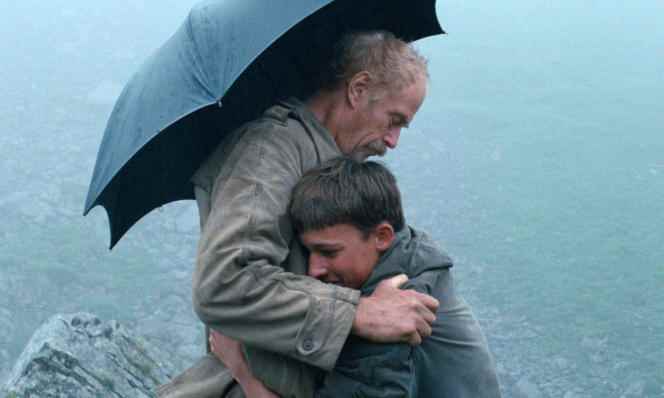The recent death of filmmaker Alain Tanner (1929-2022) has reminded us of this: of Swiss cinema, despite its borders, there is still so much to discover, and we hope that the return in restored print of Soulmate (1985), an in-house masterpiece on the German side, opens the way to similar exhumations. Signed Fredi Melchior Murer, to whom we also owe the remarkable Gray area (grauzone, 1979), the film is so sharply realistic that it borders on strangeness. The profound confusion that emerges concerns the way in which the gaze posed, almost ethnographic, on a small community in the mountain pastures, reverses without warning.
In the steep heights of the Alpine peaks, a nuclear family lives in a farm on the mountainside, away from everything, and especially from “those in the valley”, carrying out the daily tasks of cultivation, breeding and maintenance. The body carved in the rock and the face with red hair, the father (Rolf Illig) embodies a law of iron, strict and puritanical. The mother (Dorothea Moritz) prays to the Virgin. The youngest son, known as “Le Bouèbe”, a deaf-mute conceived late, lends a hand and then goes about his way, when he is not being driven crazy. There remains Belli (Johanna Lier), the eldest, forced to give up on her career as a teacher. Between these two has hatched a fusional, almost telepathic understanding.
At this stage, the film captivates by the patient description that it lends to mountain life, rough and regulated by immutable cycles. The richness of details, the natural lights, the density of the materials, the attention given to faces as well as to objects, to gestures as well as to silence, the fine division of space and time, all this creates an incredible sphere of sensitivity. All the elements seem crossed by the same telluric currents, shining with a common immanence. The slope of the ground amplifies the apprehension of a space driven towards verticality, while subtle ellipses dot the frame of the days. The brother and the sister play, turn around, look for each other.
This small, patiently described clan, from neighborhood memory, is called the “Irascibles”. This means that anger is never far away. “Le Bouèbe” reaching the age of puberty, the storm does not take long to burst between him and his father. Gone to isolate himself in the peaks, he is joined there by Belli. Then occurs, between the brother and the sister, a forbidden embrace, lined with the sensations of the surrounding nature.
Return to the primitive stage
The incestuous gesture thus arises at the heart of Soulmate, not in outrageous terms or even as a subject to be taken lightly. Rather like a return to the primitive stage, even before language (“Le Bouèbe” does not speak), the supreme omission of sin, of the forbidden, of the law and of prejudice. Fredi M. Murer aims for the motif of transgression which suddenly tilts the film into the register of ancient tragedy − and the “Irascibles” to resonate with other mythical families such as the Atrides or the Labdacides. It is, more precisely, a degradation of the figure of the father and of his symbolic power that the film ends up orchestrating: a sort of intra-family coup d’etat operated by childhood as a way of making a clean sweep.
You have 20.82% of this article left to read. The following is for subscribers only.
